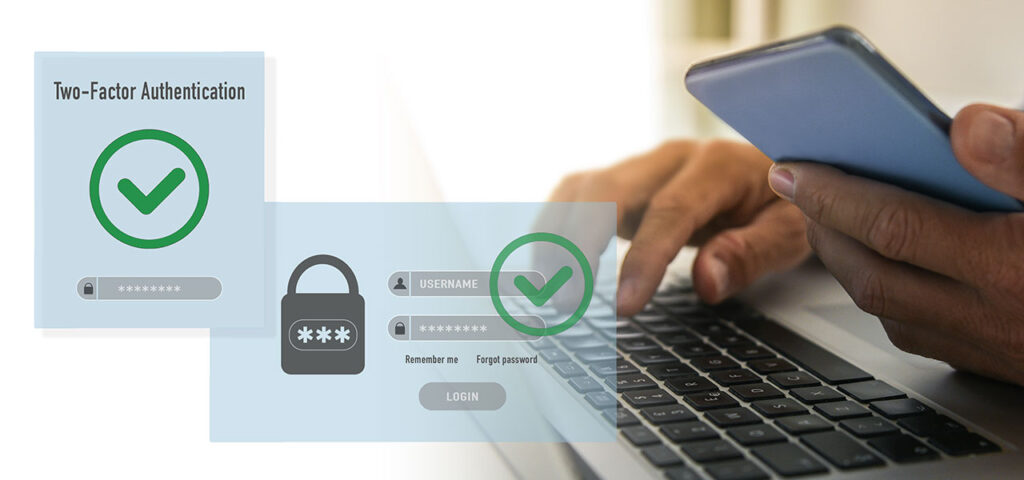In a digital age where security breaches and data theft are becoming more prevalent, safeguarding your cryptocurrency holdings has never been more critical. Two-Factor Authentication (2FA) and Multi-Signature Wallets offer robust security solutions that add layers of protection to your assets. In this blog, we will explore the concept of 2FA, its role in securing accounts, and introduce multi-signature wallets, which take security to a whole new level.
Understanding Two-Factor Authentication (2FA)
Two-Factor Authentication (2FA) is a security mechanism that adds an extra layer of protection to your online accounts. It requires users to provide two different authentication factors when attempting to access an account. The idea behind 2FA is to ensure that even if one factor is compromised, there is an additional layer of security that makes unauthorized access significantly more difficult.
The two main authentication factors in 2FA are typically:
- Something You Know: This is the most common factor and usually involves a password or a Personal Identification Number (PIN). It’s information that only the account holder should know.
- Something You Have: This factor often involves a physical device, such as a smartphone, security token, or smart card. The device generates a one-time code, which is required for account access.
How 2FA Works
The working principle of 2FA is simple but effective. Here’s how it typically works:
- You initiate the login process by entering your username and password, which is the “something you know” factor.
- After successfully entering your credentials, the system prompts you for the second factor, “something you have.”
- You provide the one-time code generated by your 2FA device.
- Once both factors are confirmed, you gain access to your account.

The Crucial Role of 2FA
The significance of 2FA in enhancing account security cannot be overstated. It serves as a formidable defense against various types of cyber threats, including phishing attacks, password breaches, and unauthorized logins. Here are some key reasons why 2FA is crucial for preventing unauthorized access:
- Mitigating Password Vulnerabilities: Even if someone manages to obtain your password through hacking or social engineering, they still need the second factor to access your account. This makes it substantially harder for malicious actors to breach your account or wallet.
- Protection from Phishing: Phishing attacks often trick users into revealing their login credentials. With 2FA, even if the phisher gets your password, they won’t have the second factor required to gain access.
- Secure Remote Access: When accessing your accounts from different devices or locations, 2FA ensures that you are the one initiating the login, adding an extra layer of protection.
- Enhanced Account Security: 2FA safeguards sensitive information and assets, not just in the cryptocurrency realm but across various online platforms.
Introducing Multi-Signature Wallets
While 2FA offers an additional layer of security for your cryptocurrency accounts, Multi-Signature (multisig) wallets take security to an even higher level, particularly for cryptocurrency holdings. A multi-signature wallet requires the use of multiple private keys to authorize a transaction, often involving several individuals or devices. Here’s how multisig wallets work:
- Number of Signatures: A multisig wallet is set up with a specific number of signatures required to authorize a transaction. For example, a 2-of-3 multisig wallet requires two out of three private keys to sign off on a transaction.
- Distribution of Keys: The private keys are typically distributed among different parties, such as the wallet owner and trusted associates. It’s also possible to use different devices and hardware to store these keys.
- Transaction Authorization: To initiate a transaction from a multisig wallet, the required number of private keys must be used to authorize the transaction. This ensures that no single party can unilaterally access or move funds from the wallet.
Enhanced Security with Multi-Signature Wallets
Multi-signature wallets offer several advantages for securing cryptocurrency holdings:
- Reduced Single Points of Failure: Unlike single-signature wallets where a single private key can authorize a transaction, multisig wallets distribute the responsibility among multiple keys and parties, reducing the risk of compromise.
- Protection from Insider Threats: In cases where multiple parties are involved, it’s less likely that an insider will engage in malicious activity, as they alone cannot initiate transactions.
- Recovery Options: In the event of a lost or compromised key, recovery options can be configured, allowing access to the wallet without risking security.
- Safekeeping of Assets: Multisig wallets are ideal for storing significant cryptocurrency holdings, adding an extra layer of protection for high-value assets.
Conclusion
In an era where securing digital assets is of paramount importance, Two-Factor Authentication (2FA) and Multi-Signature Wallets provide robust solutions to protect your cryptocurrency holdings. 2FA adds an additional layer of security to online accounts by requiring two authentication factors, making it considerably harder for unauthorized parties to gain access. On the other hand, Multi-Signature Wallets introduce a higher level of security for cryptocurrency holdings by necessitating multiple private keys to authorize transactions, reducing single points of failure and enhancing protection against both external and insider threats. By implementing these security measures, cryptocurrency users can confidently navigate the digital landscape while safeguarding their valuable assets.




